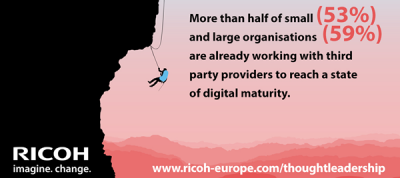Small businesses in Europe are set to reach digital maturity before their larger peers, according to new research commissioned by Ricoh Europe and conducted by Coleman Parkes.
The findings reveal that small businesses perceive digital maturity – where an organisation uses sophisticated tools to drive performance and demonstrates an on-going commitment to technology, technology-led initiatives and digitally managed processes – as a golden opportunity to level the playing field.
The majority of small business leaders (79 per cent) claim to have an implementation advantage because they can optimise processes quicker than their counterparts at larger organisations. In addition, 64 per cent believe they are able to understand, deploy and benefit from new technology in a timelier manner. Despite these findings supporting the notion that small businesses are ideally placed to achieve digital maturity thanks to their adaptability and nimbleness, they appear less aware of the full range of benefits on offer.
Although 39 per cent of small business leaders are convinced that their organisation can progress from a state of digital transformation to digital maturity within just two years, 27 per cent do not think that it will help to increase profits. Furthermore, twice as many small (23 per cent) than large (11 per cent) business leaders expect digital maturity to have no impact at all on their profits.
Large business leaders appear to be more positive about the broader range of benefits resulting from digital maturity.
Most Cited Benefits:
- Easier access to information (93 per cent)
- Improved business processes (90 per cent)
- Stronger competitive edge (86 per cent)

Yet despite placing a lower positive impact on competitive edge and profit, small business leaders do expect digital maturity to provide:
- Easier access to information (79 per cent)
- Improved business processes (79 per cent)
- Less time required to complete tasks (74 per cent)
David Mills, Chief Executive Officer at Ricoh Europe said: “While in the past we’ve seen smaller businesses lead the way in leveraging digital to amplify customer acquisition and sales, bigger businesses are gaining ground. The reality is that larger organisations have the resources to replicate and improve on the innovations of smaller businesses. They can use their size to drive more efficient operations, customer service and ultimately, profits.”

The research suggests that it may be both strategy and senior support that are causing the attitudinal differences between small and large businesses when it comes to foreseeing digital maturity as a profit driver. Of the large businesses surveyed, 66 per cent have a senior team member committed to achieving digital maturity and 81 per cent have a clear vision in place to realise the goal.
In contrast, 53 per cent of small businesses have a senior member of staff concerned with driving the business towards a state of digital maturity and 71 per cent have a clear vision. This could explain why small businesses may be less bullish when it comes to identifying benefits such as financial gain.
Despite these differences, both small and large businesses are on the same page when it comes to acknowledging that they can’t achieve digital maturity alone. Currently, more than half of small (53 per cent) and large (59 per cent) organisations are working with third party providers and this figure is expected to grow.
Mills added: “To ward off larger competition, smaller businesses need senior leadership to drive enthusiasm for digital initiatives within the organisation. External partnerships, employee training and new hires will also have a key part to play in this mix. Once small businesses have a digital strategy in place for the entire business process, including back end operations and front end customer service, they may develop a more positive outlook on how digital will enable business growth”.
For more information: www.ricoh-europe.com/thoughtleadership
